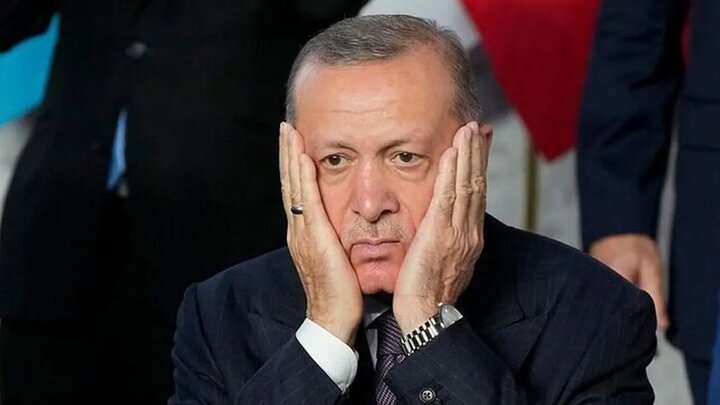The arrest of the mayor of Istanbul; the role of the Kurds and the options facing Erdogan.
Perhaps now more than ever, the dark corners of Erdogan’s desire to restart peace talks with Turkey’s Kurds have become apparent. Despite decades of efforts to marginalize Kurds from the political and social sphere of the country and to deny their ethnic and national identity, even in neighboring countries, Erdogan and his allied nationalist parties are suddenly talking about the brotherhood of Kurds and Turks in Turkey and their right to participate in the country’s affairs. In a significant twist, Erdogan no longer considers it a crime to talk about the release of imprisoned Kurdistan Workers’ Party leader Abdullah Ocalan and the return of PKK leaders to Turkey. At the Diyarbakir Newroz ceremony, which always has a political aspect rather than a cultural and traditional ceremony, the image and voice of Ocalan are broadcast after 28 years. By lighting the fire of Newroz and celebrating this celebration, Erdogan is trying to reduce the gap between the government and the Kurds in Turkey.
Now, after a few weeks since the beginning of the peace process between the PKK and Erdogan’s government, it is clear that his goal above all was to upset the balance of power inside Turkey and isolate the People’s Republic Party, which has been an ally of the Kurds since the 2019 parliamentary elections. Maybe now the answer to this question has become clear, why Erdogan suddenly thought of Ocalan’s release.
Erdoğan’s performance since 2003 shows that neither the brotherhood of Kurds and Turks nor the solution of the Turkish Kurds issue has ever been so important to him. Unless it has personal and party benefit. If it was important in his government, thousands of Turkish Kurdish citizens would not be arrested every year on the pretext of connection with the PKK. Erdoğan is thinking of lightening the power of the Turkish opposition and has a plan for that.
He knows very well that if the Turkish Kurds do not vote for the Justice and Development Party plan in the parliament and the Turkish constitution is not amended, Erdogan will not be able to participate in the presidential elections in 2028, and in this case Akram Imamoglu, the legal mayor of Istanbul and the representative of the People’s Republic Party and Erdogan’s rival, will become the president of Turkey in the upcoming elections, and he will take the same path that Erdogan started from the Istanbul municipality and has been leaning on the seat of power in Turkey for many years.
Before the start of the People’s Republic Party Congress, which was supposed to introduce Akram Imamoglu as the final candidate of this party for the upcoming elections, Erdogan arrested him and imprisoned him on charges such as connection with terrorism, financial corruption, and forgery of documents. Demonstrations were brutalized by the Turkish police,e and so far, dozens of people have been injured, and hundreds of citizens have been arrested and sent to prisons.
Of course, these actions have already taken place in Erdogan’s government, and for years, Salaheddin Demirtas, the moderate political leader of the Turkish Kurds who was a candidate for the presidency, has been in Masar prison on charges of connection with terrorism. Any of the Kurdish mayors who have gained popularity among the people have been removed, and guardians have been appointed for their municipalities.
In the opinion of the writer of these lines, two possible options regarding the fate of the recent developments in Turkey are possible:
The first possibility: If Erdogan and the Ankara government can, by releasing Öcalan, convince the PKK to hold a congress soon and dissolve and disarm this party, and if the Kurdish representatives of the parliament (Dem Party) join the coalition of the Justice and Development Party (AKP) and the Nationalist Movement Party (MHP) with Öcalan’s green light to amend the law, the Kurdish Dem Party will effectively withdraw from the Republican People’s Party (CHP) coalition, which is the same party as Ekrem İmamoğlu, and the Turkish opposition will be defeated, and Ekrem İmamoğlu may remain in prison for many years, like Demirtaş and Öcalan.
Of course, considering the PKK’s announcement that it is not possible to hold a meeting for its leaders due to the continuous attacks of the Turkish army, and it has warned Erdogan that the congress and disarmament will be canceled if the promises are not fulfilled or Öcalan is not released, it does not seem serious at the moment.
The second possibility: The second possibility becomes stronger when the demonstrations in Turkey become more intense and continue in the coming days. The emergence of security and political challenges in Turkey, which is in the most critical economic conditions of the last decade, can bring other groups, including the Kurds, to the streets and make the turmoil in Turkey wider.
If the decision-making power in Ankara suffers a crisis, Qandil, who has no desire to implement Öcalan’s order and is currently focusing on Turkey’s internal tension, considers it futile to implement the peace call; In that case, with the failure of the negotiations and the loss of importance of Öcalan’s February 27 demand, it is not unlikely that the Kurds and supporters of the Republican People’s Party and other opposition movements in the country will also line up against the ruling party in Turkey, and Erdogan’s rule in Turkey will face a serious challenge.

